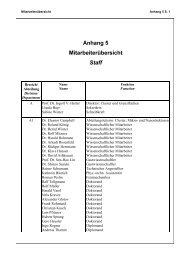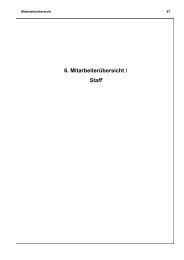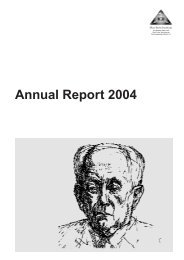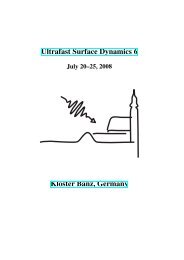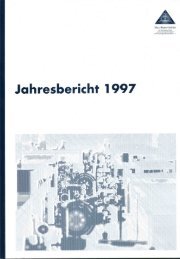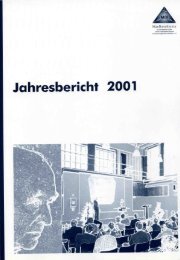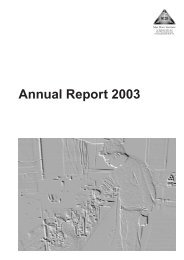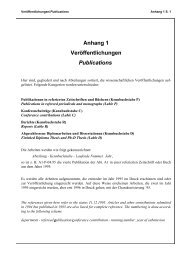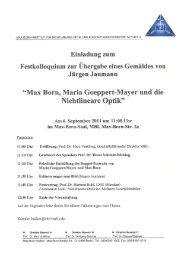Create successful ePaper yourself
Turn your PDF publications into a flip-book with our unique Google optimized e-Paper software.
Foreword<br />
On December 10 and 11, 2004, the <strong>Max</strong> <strong>Born</strong> <strong>Institut</strong>e in <strong>Berlin</strong> celebrated the 50th anniversary<br />
of the awarding of the Nobel Prize to <strong>Max</strong> <strong>Born</strong>, whose name our institute is honored to<br />
bear. The ceremony comprised a scientific colloquium and a reception on December 10, and<br />
lectures on his life and science and an exhibition for the general public on the next day. Incidentally,<br />
December 11 also marked the 122th anniversary of <strong>Max</strong> <strong>Born</strong>'s birthday.<br />
The vestibule of the <strong>Max</strong>-<strong>Born</strong>-Saal, our main lecture hall, will from now on be graced by a<br />
plaque, modelled after a well-known pencil drawing by <strong>Max</strong> <strong>Born</strong>'s daughter, Gritli <strong>Born</strong>, and<br />
unveiled on this occasion. We express our gratitude to Professor G.V.R. <strong>Born</strong>, his eldest son,<br />
for permission to use the drawing as a template.<br />
The life and the work of <strong>Max</strong> <strong>Born</strong> was commemorated in a two-day exhibition organized by<br />
Dr. h.c. Jost Lemmerich, whom we thank profoundly for his remarkable work in designing and<br />
assembling the exhibits. We note that they were later also displayed during the Annual Meeting<br />
of the German Physical Society in <strong>Berlin</strong> in the spring of 2005. During our ceremony, the<br />
exhibition attracted considerable attention, most notably by the students of the <strong>Max</strong> <strong>Born</strong> Gymnasium<br />
in <strong>Berlin</strong> who were excited to learn about the life of <strong>Max</strong> <strong>Born</strong> and to meet his son<br />
Gustav in person, an event that was apparently much enjoyed by both parties.<br />
The <strong>Max</strong> <strong>Born</strong> institute was proud to welcome more than 200 guests from all over Germany to<br />
this ceremony. In the present volume, we present the three main lectures delivered on December<br />
10 to our guests and to the staff of the institute. We were privileged to hear Professor<br />
G.V.R. <strong>Born</strong>, FRS, speak about "<strong>Max</strong> <strong>Born</strong>: a filial memoir", encompassing reminiscences of his<br />
father's life and on his own mounting concern – being an eminent scientist himself, albeit in a<br />
completely different field – about the effects of science on the future of mankind.<br />
Professor Paul B. Corkum, FRS, Ottawa, Canada, gave a vivid account of the currently emerging<br />
field of attosecond physics, which allows scientists to image and observe atomic phenomena<br />
on the time-scale of the electronic motion in molecules and atoms. In many aspects, this<br />
work rests on <strong>Max</strong> <strong>Born</strong>'s revolutionary achievements during the early decades of the past century,<br />
where science first developed the concepts that govern the motion of particles on atomic<br />
scales. Professor Knut Urban, President of the German Physical Society DPG, gave an insightful<br />
summary of the volume and scope of <strong>Max</strong> <strong>Born</strong>'s work in physics. The ceremony was completed<br />
by a brief address by the Rector of the University of Wroclaw, <strong>Max</strong> <strong>Born</strong>'s birthplace.<br />
This address is also contained in the present booklet.<br />
The <strong>Max</strong> <strong>Born</strong> <strong>Institut</strong>e takes this opportunity to express its sincere gratitude to the speakers,<br />
to the organizer of the exhibition, and to our guests. Above all, however, the <strong>Institut</strong>e is proud<br />
to honor and keep alive the memory of one of the most outstanding physicists and humanists<br />
of his time.<br />
Wolfgang Sandner<br />
<strong>Max</strong>-<strong>Born</strong>-<strong>Institut</strong>, <strong>Berlin</strong><br />
Germany



